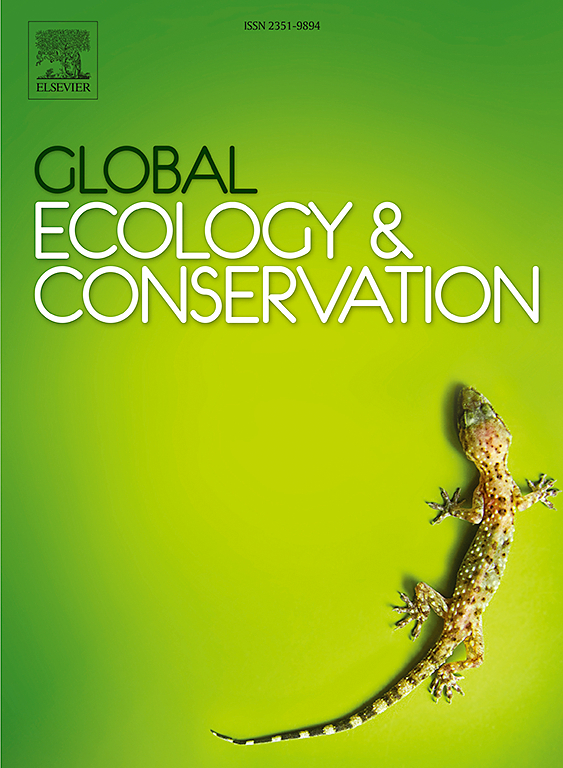Evaluation of habitat suitability and migratory paths of an endangered raptor, Steppe Eagle (Aquila nipalensis) in Iran
IF 3.5
2区 环境科学与生态学
Q1 BIODIVERSITY CONSERVATION
引用次数: 0
Abstract
Understanding habitat suitability, the environmental variables limiting the distribution of species, and migratory paths are important issues for conservation of threatened bird species. Identifying areas important for birds and their overlap with conservation areas (CAs) can guide conservation managers in establishing new CAs. The Steppe Eagle (Aquila nipalensis) is a globally endangered winter visitor raptor in Iran. We used 164 occurrence records of Steppe Eagles and data on 12 environmental variables in Iran as input to ensemble modeling and electrical circuit theory models to identify, respectively, potential wintering areas and migratory paths between those wintering areas. Our results revealed that elevation, distance to rodents, mean diurnal range, distance to villages, and distance to cities were the most influential variables for habitat suitability in Iran. Potential wintering areas identified by our models were mainly located in the north and south of Iran and migratory paths connected these areas through the central plains. CAs covered about one-fifth of potential wintering areas. Conservation of the species within potential wintering areas and the migratory paths from northern to southern Iran is necessary for the survival of this endangered species in its entire distribution. Therefore, wildlife managers should pay increased attention to non-protected parts of potential wintering areas in order to establish new CAs and protect migration paths against threats. Our results pave the way for proper planning for the conservation of threatened raptors in Iran, particularly Steppe Eagle.
评估伊朗濒危猛禽草原鹰(Aquila nipalensis)的栖息地适宜性和迁徙路径
了解栖息地的适宜性、限制物种分布的环境变量以及迁徙路径是保护濒危鸟类的重要问题。确定对鸟类重要的区域及其与保护区(CA)的重叠情况,可以指导保护管理人员建立新的保护区。草原鹰(Aquila nipalensis)是伊朗的一种全球濒危冬候猛禽。我们利用 164 条草原鹰的出现记录和伊朗的 12 个环境变量数据作为集合建模和电路理论模型的输入,分别确定了潜在的越冬区域和这些越冬区域之间的迁徙路径。我们的研究结果表明,海拔、与啮齿动物的距离、平均昼夜活动范围、与村庄的距离和与城市的距离是对伊朗栖息地适宜性影响最大的变量。我们的模型确定的潜在越冬区主要位于伊朗的北部和南部,迁徙路径通过中部平原将这些地区连接起来。CA覆盖了约五分之一的潜在越冬区。保护潜在越冬区内的物种以及从伊朗北部到南部的迁徙路径对这一濒危物种在其整个分布区的生存是必要的。因此,野生动物管理者应更多地关注潜在越冬区中未受保护的部分,以建立新的 CA 并保护迁徙路径免受威胁。我们的研究结果为在伊朗保护濒危猛禽,尤其是草原雕的适当规划铺平了道路。
本文章由计算机程序翻译,如有差异,请以英文原文为准。
求助全文
约1分钟内获得全文
求助全文
来源期刊

Global Ecology and Conservation
Agricultural and Biological Sciences-Ecology, Evolution, Behavior and Systematics
CiteScore
8.10
自引率
5.00%
发文量
346
审稿时长
83 days
期刊介绍:
Global Ecology and Conservation is a peer-reviewed, open-access journal covering all sub-disciplines of ecological and conservation science: from theory to practice, from molecules to ecosystems, from regional to global. The fields covered include: organismal, population, community, and ecosystem ecology; physiological, evolutionary, and behavioral ecology; and conservation science.
 求助内容:
求助内容: 应助结果提醒方式:
应助结果提醒方式:


